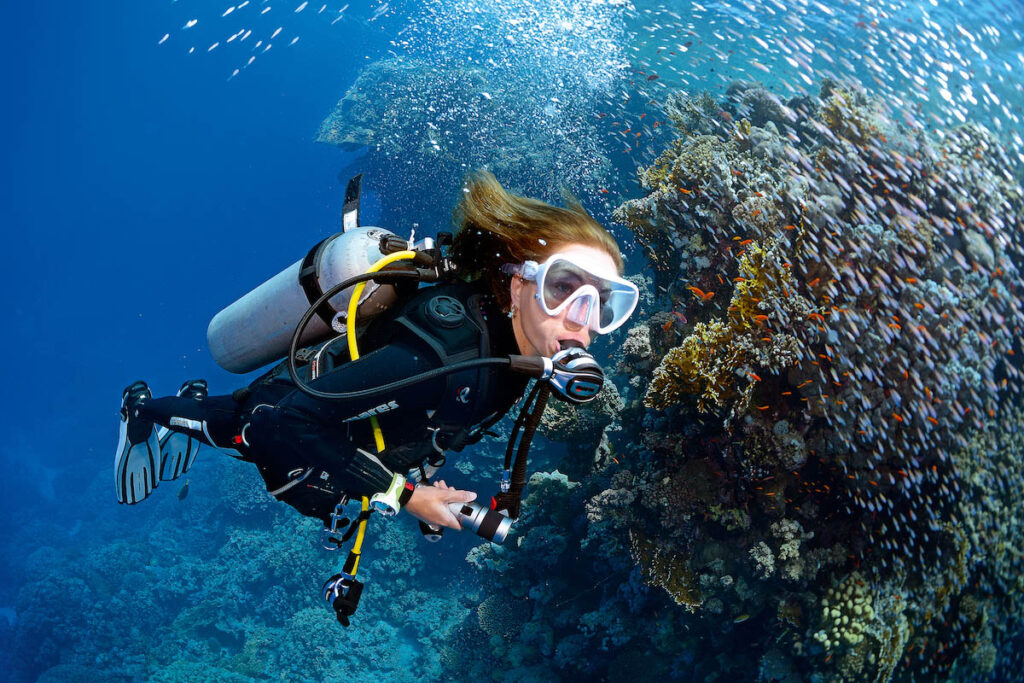Dreaming of turning your passion for the ocean into a career? You’re not alone. With a global appetite for scuba diving on the rise, 2025 is shaping up to be an exciting time to enter the dive industry. But while the dream of working in paradise is compelling, the reality is that competition is increasing, and employers are looking for more than just someone who can teach the basics. To land the best jobs, you need a smart plan tailored to today’s evolving market and your unique skills.
In this guide, we look at the dive job market in 2025 and share what aspiring dive professionals need to know to set themselves apart from the crowd and succeed.
What Dive Jobs Look Like in 2025
The dive industry is bouncing back post-pandemic with an even greater emphasis on high-quality instructors, eco-conscious dive operators, and versatile team members who bring more to the table than just certifications.
Employers are looking for:
- Multi-skilled team players (teaching, retail, equipment repair, media).
- Instructors who can offer value year-round, not just in high season.
- Pros with digital fluency, whether for marketing, booking systems, or customer communication.
- People with strong guest-service skills, not just great dive skills.
It’s also more competitive. In popular regions like Southeast Asia and the Caribbean, many entry-level pros are competing for limited positions. Standing out requires more than just finishing your Divemaster or IDC —it’s about building a professional profile that employers trust and need.
Know Your Why
But before you become a professional diver, take time to reflect on what drives you. Why do you want to work in diving? What kind of experiences light you up, and what type of dive environments or roles feel meaningful to you?
Knowing what matters to you will not only keep you focused on the tough days – it will also help you choose the right path and work settings that align with your values and interests. This clarity will guide your decisions and help you recognize the right opportunities when they come along.
So, let’s get started:
- Build a Foundation That Sets You Apart
If you’re new to diving, the first steps are to earn your Open Water Diver and then the Advanced Open Water Diver certification. After that, complete a Rescue Diver course. This is one of the best courses you will ever do as a diver. It builds your confidence in many ways and is a great stepping stone to becoming a professional diver. After that, the next step is to become a Dive Guide or Divemaster.
But don’t rush your training. In 2025, dive centers are leaning towards Divemasters and Instructors with real-world diving and life experience. Instead of racing through the ranks to become an instructor, take time to:
- Log dives in different conditions (currents, cold water, altitude)
- Assist instructors
- Practice leading dives and group management
- Explore dive specialty courses that interest you (not just those that look good on a CV)
- Develop Some Niche Skills
Generic dive instructors are everywhere. What will make you memorable is having something extra to offer. Choose a niche and start building on it early:
- Marine ecology & conservation: There are some great opportunities for divers who also have experience in marine conservation and ecology. Start by becoming an Ecology Specialty Diver and then volunteer with local conservation groups to gain real-world experience.
- Underwater photography & social media: Learn how to shoot, edit, and share underwater content—many dive centers need this.
- Gear repair and gas blending: Take an Equipment Techniques or Gas Blender course and ask your local dive shop if you can assist with servicing.
- Languages: Being multilingual is a huge plus in tourist-heavy destinations.
- Boat handling: Learn the basics of knot tying, navigation, and safety.
- Marketing and content creation: Dive centers increasingly rely on digital content and online visibility. Understanding how to create engaging social media posts, short videos, newsletters, or blogs can give you an edge.
- Customer service and front-of-house experience: Knowing how to manage bookings, check-ins, and customer care will make you indispensable at busy dive operations.
These niche skills will help you stand out and can be the deciding factor when choosing between two equally certified candidates. Having a variety of skills not only improves your employability but also creates more opportunities to earn a living through diverse income streams.
- Be Strategic About Your Professional Training
Your choice of where to train as a divemaster and instructor can shape the trajectory of your career. It’s easy to be drawn in by sun-soaked destinations, but the right training environment should reflect your learning style, comfort level, and long-term career goals.
Ask yourself: What dive conditions am I most comfortable in? Do I want to train in challenging conditions to grow confidence, or would I benefit from calmer, easier waters while building my foundational skills? What’s the most accessible and affordable location for me to complete training? And perhaps most importantly—what kind of diving environment do I want to work in after I’m certified?
A high-quality Dive Guide, Divemaster, or Instructor Training Course (ITC) should go beyond the basics—preparing you for real-world challenges in diver safety, customer service, group leadership, and dive shop operations.
When choosing your dive center, look for:
- Centers with a strong reputation for professional training.
- Instructor Trainers who offer guidance beyond the minimum course requirements.
- Smaller class sizes, where you’ll get tailored feedback and more practice time.
- Build Experience That Counts
In 2025, real-world experience matters more than ever—but it’s important to acknowledge that not all pathways are the same. Internships, particularly unpaid ones, are a popular route for gaining hands-on experience, but they’re not without controversy. Some divers feel that unpaid internships undervalue professional labor, while others view them as a fair exchange for training, dive time, and industry connections. It ultimately comes down to your personal circumstances and values.
If you’re considering an internship, research carefully. Ask what’s included (accommodation, meals, certifications?), what’s expected of you, and whether you’ll get genuine mentorship or just unpaid work.
Not keen on an internship? There are other ways to build experience:
- Shadow instructors at your local dive center.
- Join a marine conservation trip as a diver or assistant.
- Work front-of-house or retail in a dive shop.
- Help maintain rental gear or boats.
These alternatives can be just as valuable and might even lead to paid opportunities.
- Be Visible and Professional Online
Employers often check social profiles before hiring. In 2025, having a professional digital presence can work to your advantage—if you manage it well.
Start by creating a simple one- to two-page website that includes your dive bio, certifications, number of dives, some high-quality images, and a way to contact you. Platforms like Wix and Squarespace make it easy to build an attractive site, even with zero coding experience.
Then, choose your social platform wisely. You don’t need to be on every app. Pick one that suits your style – Instagram for visual storytelling, LinkedIn for professional networking, or TikTok for short educational clips—and build your presence slowly. Interact meaningfully and don’t feel pressure to post daily or follow trends that don’t feel natural.
A thoughtful, authentic online presence shows employers that you’re professional, committed, and ready to represent their business.
- Choose the Right Destination
Opportunities are growing in less-saturated regions where dive tourism is recovering or expanding. In 2025, consider:
- Saudi Arabia: A rising Red Sea hotspot with growing eco-tourism.
- The Azores: This Atlantic gem has a growing interest in marine wildlife.
- Remote Pacific Islands: Places like Yap, Niue, or Vanuatu are seeking pros willing to commit longer term.
- Cold water destinations: Norway, Iceland, and Canada are seeing more dive travelers and need specialists.
But don’t overlook the classic hotspots—they’re popular for a reason. Regions like Thailand (especially Koh Tao), Indonesia (Bali and Komodo), Egypt, the Maldives, and the Caribbean still offer consistent opportunities for professional divers. However, competition in these locations can be fierce. To stand out, you’ll need excellent people skills, versatility, and ideally, multiple specialties to teach.
Looking for work? Start with the SSI Jobs Worldwide Portal to find the latest opportunities worldwide.
- Soft Skills Matter
In 2025, technical skills will get you certified, but emotional intelligence will get you hired. Dive centers are looking for professionals who are self-aware, calm under pressure, and able to connect with a wide range of people. Being a great communicator, an empathic listener, and a team player can make all the difference.
Breaking into the dive industry in 2025 means being smart, proactive, and genuinely enthusiastic. It’s not enough to get certified—you have to show up, offer value, and be someone people want to work with.
But the payoff is huge. A career in diving means living with purpose, working in the ocean, and helping others to achieve their dreams.










